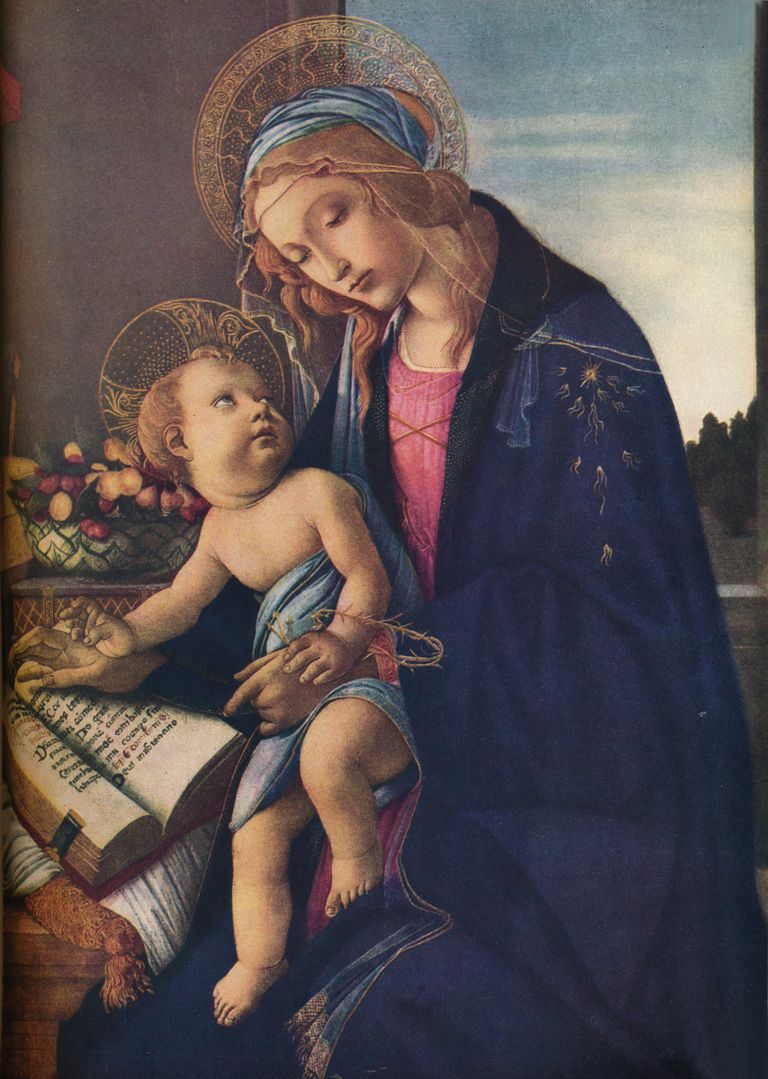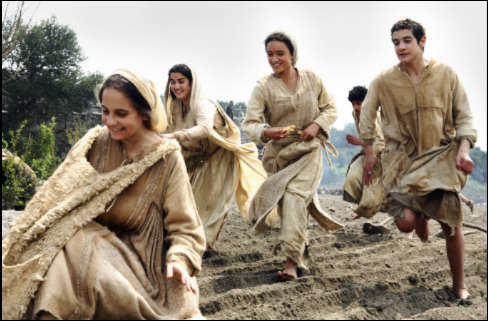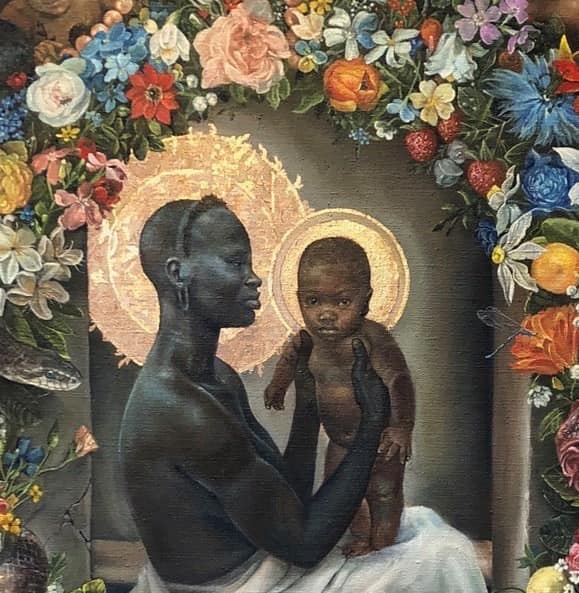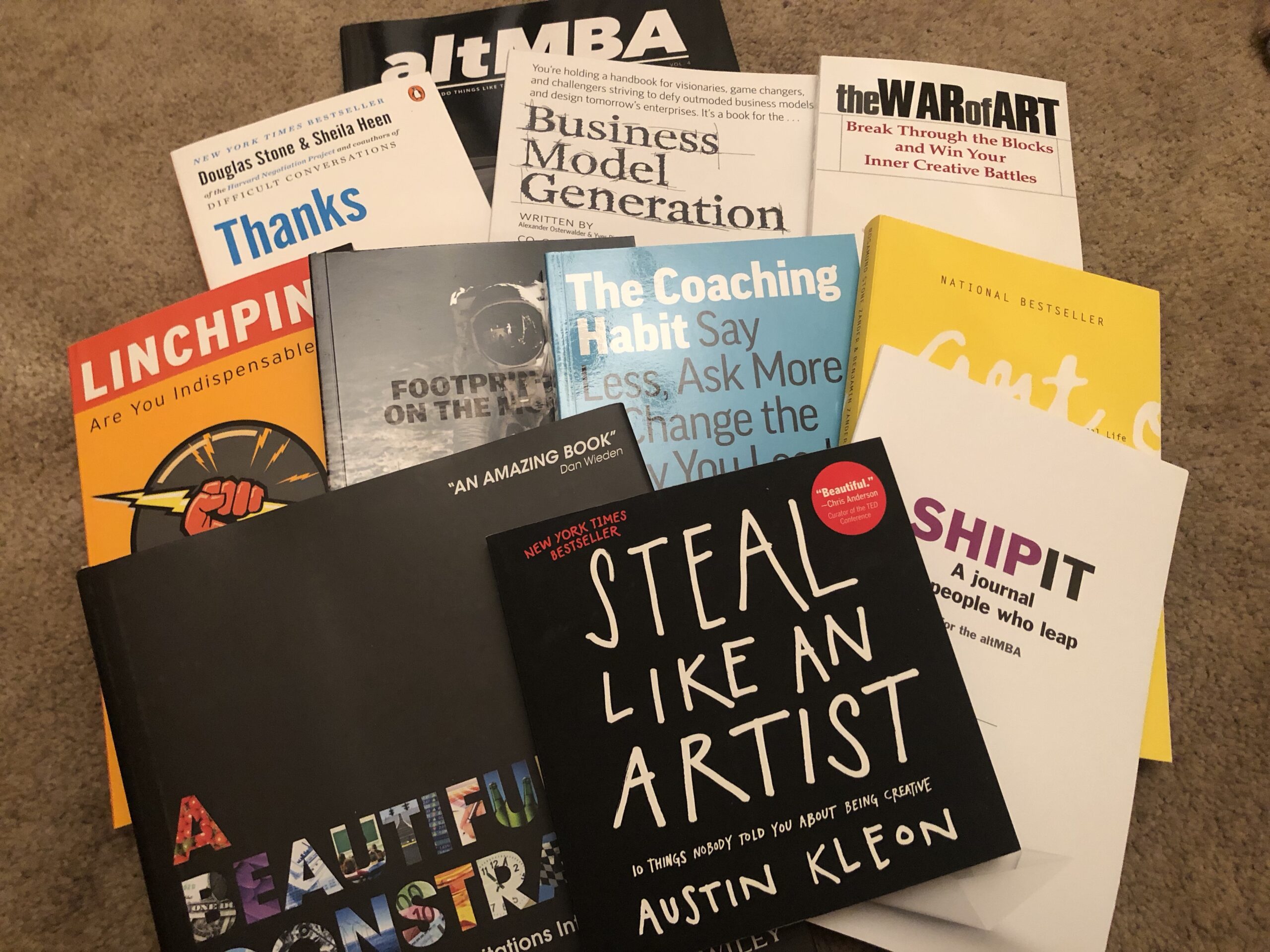Throughout my life, I have had an image indelibly ingrained in my brain of a young woman, a girl really, compliant, humble, quiet and full of grace. She is content to let life happen to her and doesn’t question her fate. Instead, she has a radiant glow about her as she gently glides through her life. I’m not even sure she has legs, truth be told. That’s how glide-y she is.
Who is this girl? That would be Mary, the mother of Jesus. The 13-year old perfect heroine. The young woman who never raises her voice, even when she has lost her 12-year old son (keep in mind, that makes her a wizened 25 at that point) in Jerusalem. Upon finding him, his sassy answer is basically, “Duh. You should have known I’d be in the temple. Come ON, Mom!”
What is Mary’s response? We don’t really know (you know, because women should be only marginally seen and never heard), but we can assume it’s one of quiet resignation: “You’re right, son. I really should have known. Now, if it’s all right with you, could we start the long journey home…again?” (Luke 2:41-52)
Whether it’s through song, artistic depiction (don’t even get me started on the fact that thanks to European artists, she’s also basically a Scandinavian girl, perfectly blond haired and blue eyed. I think her name was actually Mary Carlsen, wasn’t it?) or the stories from the New Testament, Mary is the picture of perfection.

Or at least that’s what we’ve been told and shown. Apparently perfection is to have no voice, no opinion and no question over your own life…especially if you are of the female persuasion.
For two+ millennia, western women (really just about all the women across the globe) have been subjected to living up to a standard of perfection that is actually anything but.
And I have just never been that kind of woman. And I actually have never really believed that Mary was either.
Years ago, I read the book Mary: A Flesh-and-Blood Biography of the Virgin Mother by Lesley Hazleton. This book, this glorious read that gives power, voice and choice to a young woman who faced horrific challenges throughout her entire life, is largely responsible for the beginning of when I started to pull away from organized religion.
Good Reads notes:
We are so used to the legendary image of the Madonna that the very idea of her as a real person sets the eyes alight. Starting with the dark-skinned, hard-muscled girl barely out of adolescence when she gave birth, Lesley Hazleton weaves together the many facets of Mary’s existence: peasant villager, wise woman and healer, activist, mother, teacher, and yes, virgin, though in a sense we have long forgotten…Strong and courageous, the source of her son’s powers of healing and wisdom, the Mary we see here did not merely assent to her role in history, but actively chose it, and lived it to the fullest.
As a Jewish girl attending an all-girls Catholic school somewhere on the East coast, Ms Hazleton seeks out the statue of the Virgin Mary in the chapel because she is the only other Jew in the school. And thus begins her fascination with this largely unknown and almost entirely silenced woman. And thus begins this astonishing story, woven together with history, politics, medicine, linguistics, religion and more.
And then my mother recently sent me, “No More Lying About Mary,” by Nancy Rockwell:
It is Mary’s grace that has attracted God’s attention. And what is this grace? It is what Luke shows us in her conversation and her actions – courage, boldness, grit, ringing convictions about justice. Not submissive meekness. Grace is not submission. And the power of God is never meek.
Not submissive meekness, but grace, which Ms Rockwell defines as “courage, boldness, grit, ringing convictions about justice.”
I have those same qualities, but throughout my entire life people have been trying to wring them out of me. Couldn’t I just be a little less bold? A little less gritty? Couldn’t I just let things go and be quiet? Couldn’t I be just a tad more graceful? A little more meek?
What they really mean is couldn’t I just know my place, sit back and let the “right people” manage things?
And to that I declare a resounding NO. It’s the same declaration I have been proclaiming my entire life, and it’s the same declaration I will continue to proclaim.
If you read this blog (or if you haven’t, this is a two-for-one post—huzzah!), you know that I have something extremely personal in common with Mary, regardless of whether she was meek and mild or loud and proud. Traditionally-defined Mary and I are an odd pair—an unlikely twosome for God to have bestowed this gift upon. Unless Mary wasn’t what we have all been duped in to believing she was.
What if Mary was something like me? What if she walked and moved “too aggressively”? What if she was a voracious reader and eschewed dusting and liked to wander off by herself and was a risk taker and spoke her mind and challenged the status quo and questioned her rabbi and his teachings and refused to be told that she was anything less than anyone else?

What if she also questioned her own worth and spent much of her life wishing she were thinner and one inch taller and a better bread maker and more patient and someone who could occasionally just let something seemingly small go instead of scrapping over it? What if she was tender hearted and loved babies but never really planned to have any? What if she cried easily and was made of steel?
Did she consistently stand in awe of the child she produced? Did she see where her talents and gifts and weaknesses were instilled in him while also marveling at the qualities he possessed that seemed to come from somewhere not quite of this world?
What if Mary was simply a human being, a woman, regardless her age, who had a child who went on to embrace and take further her politics, her healing, her feisty-ness, her doubts over religion, her sense of adventure and more?
In short, what if Mary was more than a crock pot to slow cook the son of God? What if she played a pivotal role in his foundation? What if she wasn’t perfect in the way we have been conditioned to define perfect? What if, instead, she was absolutely practically perfect because she was a complete person, complex, challenging, full of humor and fire, calm and enraged, able to make up her own mind and to choose her own destiny?
That’s the perfect Mary I am choosing to believe in this Christmas season and going forward because I like that Mary. I recognize her traits, and I can make sense of her story and the profound role that she played. And I can recognize and find my place in the great cosmic, universal energy that surrounds and supports us all when I see a piece of myself in her.
Addendum one week later because this post from my friend Leslie Mahraun simply stunned me with its simple and profound question:

Sometimes I wonder
if Mary breastfed Jesus.
if she cried out when he bit her
or if she sobbed when he would not latch.
and sometimes I wonder
if this is all too vulgar
to ask in a church
full of men
without milk stains on their shirts
or coconut oil on their breasts
preaching from pulpits off limits to the Mother of God.
but then i think of feeding Jesus,
birthing Jesus,
the expulsion of blood
and smell of sweat,
the salt of a mother’s tears
onto the soft head of the Salt of the Earth,
feeling lonely
and tired
hungry
annoyed
overwhelmed
loving
and i think,
if the vulgarity of birth is not
honestly preached
by men who carry power but not burden,
who carry privilege but not labor,
who carry authority but not submission,
then it should not be preached at all.
because the real scandal of the Birth of God
lies in the cracked nipples of a
14 year old
and not in the sermons of ministers
who say women
are too delicate
to lead.
-Kaitlin Hardy Shetler
*Originally posted by Traci Blackmon on Facebook





3 Comments
Tim Mathern
For many years I worked as a social worker with teenagers who were pregnant. They gave me my first glimpse of the strength of womanhood contrary to the culture teaching of her flailings.
Dayna Del Val
I’m not surprised that you would have come to this conclusion, Senator, because you are a compassionate human. I appreciate your sentiments and know that you were a force for good for all those young women who, if they were like me, desperately needed light and love to surround them then. Thanks for reading and writing!
Pingback: